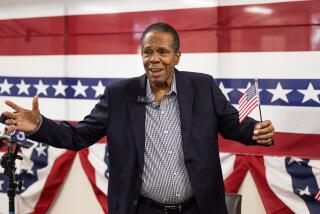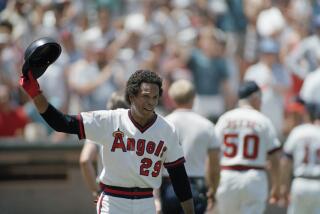In This Case, a Child Did Lead
- Share via
Rod Carew’s major league career was longer than the life of his youngest daughter. He played 19 years for the Minnesota Twins and the California Angels; Michelle Carew was 18 when she passed away in the Children Hospital of Orange County’s oncology ward Wednesday morning.
In those 19 years, Rod Carew came to be known as “a hero” for all the wrong reasons--a prodigious batting average, several thousand base hits, 18 appearances in a midsummer all-star game. Because he could hit a baseball hard and on a line, he was lavished with fame and public acclaim, had his uniform number retired, had his bust sculpted and showcased in a museum.
Heroism?
It wasn’t until the last seven months that Carew truly understood the meaning of the word.
He found his role model in young Michelle, in none of the customary places. Michelle set her example from a hospital bed, often from inside a sterile plastic bubble, surrounded by imposing medical machinery. She was confined there, for most of the last seven months, after being diagnosed with acute nonlymphocytic leukemia, one of the most aggressive strains of blood cancer.
By Rod’s account, Michelle “should have died last December.” At one point, her electrocardiogram flatlined for nearly a minute. She endured 15 operations, including one that saved her eyesight in September and another, an umbilical cord blood transplant, late last month, a final gamble taken when no suitable bone-marrow donor could be found.
No donor was found because Michelle’s case was doubly cruel. Her strain of leukemia had one of the smallest survival rates--and her bone marrow type was among the rarest, Michelle having been conceived by a white mother and a black father. Finding a compatible donor, Rod said, was “like finding a needle in a haystack.”
It was all too much. Too overwhelming. Too brutally unfair.
But when Michelle was well enough to be interviewed in early March, she smiled and declared, “I’ve gone through so much stuff, if I didn’t beat this I’d be [ticked]. So I am going to beat it.”
That was typical of Michelle’s spirit. In the tightly knit Carew family, rocked by one medical setback after another, Michelle volunteered to serve as emotional guidance counselor, doing what she could to keep her mom, Marilynn, away from the Kleenex box.
To lighten the mood, she would joke about her chemotherapy treatment--”I like sticking my head out the window and feeling the wind through my hair . . . whatever’s left of it.”
Or about the blood transfusion she had received from her sister--”God, I can tell Stephanie gave me platelets. I have this urge to go shopping.”
She made the whole family laugh, when the only available option seemed to be crying.
“I like making people smile,” Michelle said in March, “and I’ll continue to do that. I don’t think there’s a day that goes by that I don’t smile. Even when I cry, I smile.”
Michelle’s friends called her “a pleaser.” Everyone in her midst had to be happy, or else. After Michelle’s condition became public, two former classmates--one from high school, one from junior high--sent Michelle letters to thank her for befriending them when they couldn’t make any friends at school or needed someone to step in and stop a fight. The letters so touched Marilynn that she kept both of them in her purse for months.
Michelle also affected Rod, in ways that are nothing short of remarkable. Rod’s prickly relationship with the media as a player has been duly chronicled. Suffice it to say, if Rod could have played his 19 years in a vacuum, with no one watching or writing or asking him to describe that fastball afterward, he’d have gladly signed right up.
His daughter prodded him out of that vacuum. Rod has become a vocal, visible, passionate spokesman in the push to step up bone-marrow donations, opening himself and his home to the media and the public for the cause--because Michelle asked him to.
Unable to mount the campaign from her bed, Michelle asked Rod to become her voice--not for herself, she told him, but for her new friends at CHOC.
“There’s all these other kids on this floor, so many in other hospitals who need [bone marrow],” Michelle said last month. Awareness had to be raised, she noted, and “I have a father who can do it.”
Rod once said, admiringly, that Michelle was so outgoing, she could walk into a room of 50 strangers and within 15 minutes be friends with 48 of them. Rod learned from his daughter. Years ago, Rod could have entered that same room and spent 15 minutes without saying hello. Today, the National Bone Marrow Program credits the publicity campaign headed by Rod for generating more than 70,000 phone calls to the program and increasing donor registry by 33%.
Wednesday morning, within hours of Michelle’s passing, Rod Carew stood in front of the microphones and the cameras and did something most of us could not--answer questions about the death of his beloved daughter.
It was a courageous act, nothing short, but Rod had given Michelle his word that the good work started would continue. So he stood there and told the story of Michelle Carew another time, spreading the word, and the vital phone number--800-MARROW2.
Heroism, supposedly, has nothing to do with genes, or heredity, or bloodlines. But it can be passed along. In the case of Rod and Michelle Carew, it was passed from daughter to father.
More to Read
Go beyond the scoreboard
Get the latest on L.A.'s teams in the daily Sports Report newsletter.
You may occasionally receive promotional content from the Los Angeles Times.










